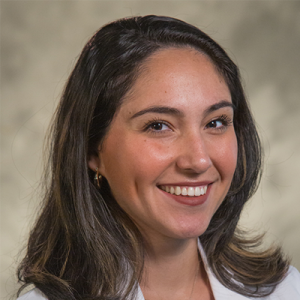
Anisa Eshraghi, DO
What are your career goals?
I aim for my practice to be as preventative as possible. As a DO, I have been trained to see patients as whole beings, whose experiences, cultural backgrounds, social contexts, personalities, attitudes, skills, and belief systems deeply inform their health. I hope to work in outpatient primary care and weight management, as well as see a large pediatric population. I would like to work at a clinic that is strongly interdisciplinary, and offers patients access to behavioral health specialists, nutritionists, physical and occupational therapists, geriatricians, and community resources such as cooking classes, chronic disease and mental health support groups, and fitness classes.
What attracted you to the Duke Family Medicine Residency Program?
I wanted to be at a program that takes wellness very seriously. I went to a workshop at NCAFP's Family Medicine Day given by Dr. Will Bynum on how shame affects our mental/emotional well-being, and I heard the term "psychological safety" used frequently in my interactions with Duke faculty. I knew this would be a program that sees residents as human beings first. I believe that our roles as community members, neighbors, friends, partners, parents, siblings, and children of our parents/caregivers all deeply inform who we are as physicians. We must be given the breathing room to show up fully in other spaces of life in order to be the best doctors we can be.
In your opinion, what makes Duke Family Medicine special?
This program prioritizes social consciousness and well-roundedness in its residents and providers. We are fortunate to be able to refer patients to many community resources. We participate in Centering Pregnancy and Parenting which offer new parents close engagement with their medical providers and peer groups. We also refer many patients to DukeWell, which offers care management, preventive wellness, pharmacy services, care transitions, and social needs support. We have designated clinic staff who advise us on insurance questions and help us get patients resources they need.
What strengths or skills do you have that could be of benefit to the community?
I believe in the power of manual medicine, and using OMT to treat common conditions, such as musculoskeletal issues (sprains/strains/muscle tension), headaches, constipation, and sinus issues.
What are you passionate about?
Grassroots community building, racial justice in medical education, interdisciplinary collaboration, nutrition/body movement education, osteopathic manipulative medicine (or manual medicine)
What are your hobbies outside of work?
Yoga, nature walks, listening to podcasts and Taylor Swift, being active in the Triangle Baha'i Faith community, volunteering in youth mentorship programs and teaching neighborhood children's virtues classes
If you have lived in the area for awhile, what is the best part of living in the Durham/Triangle area?
The weather and the natural landscape. Beaches, mountains, lakes, and trails are all close by!
What is something interesting that not many people know about you?
My father's side of the family are Iranian refugees
So far, what has surprised you most about Duke?
I knew that I was coming to a wellness-oriented program, but I have been astonished and grateful at the level of commitment that residents and faculty show at checking in on one another, debriefing, and offering to support one another. I also have been pleasantly surprised at our pediatric volume in the clinic! My first rotation was in newborn medicine, and I have had some lovely continuity with becoming the PCP and doing well child checks on my very first patients as an intern.
What is your hometown?
North Wales, Pennsylvania
Education & Training
Campbell University School of Osteopathic Medicine, D.O.
Temple University, B.S. in Cellular and Molecular Neuroscience, Minor in Spanish